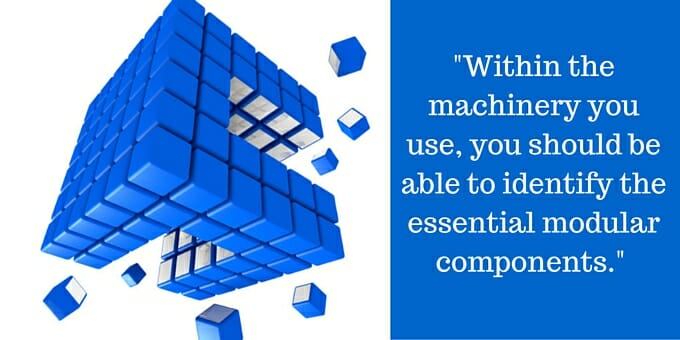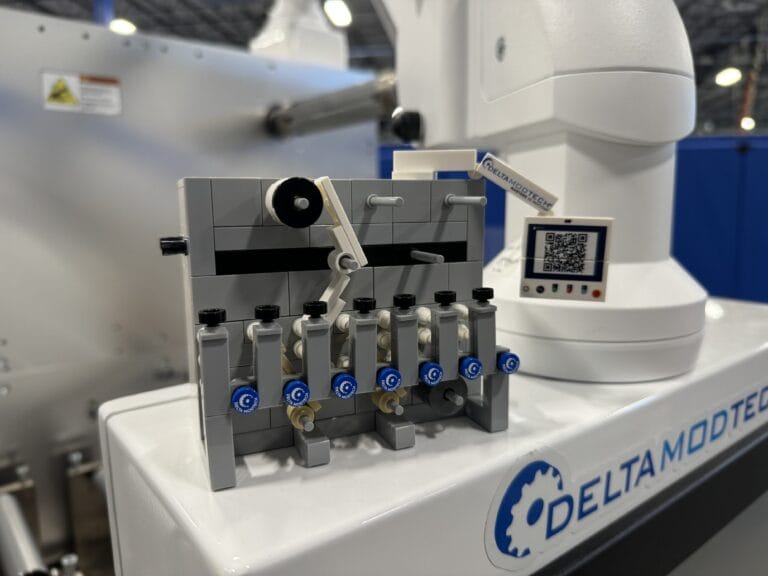
Why a Truly Modular Converting Machine is Essential to Your Manufacturing Process
What do we mean by modularity? Wikipedia gives us the broad-based definition of modularity in relation to manufacturing: “In manufacturing, modularity refers to the use of exchangeable parts or options in the fabrication of an object.”

From a theoretical perspective, the level of modularity is dictated by complex, converting jobs. As noted by the Harvard Business Review:
“When (R&D and manufacturing) modularity is low, the product design can’t be fully codified in written specification, and design choices influencing manufacturing choices (and vice versa) in subtle and difficult-to-predict ways. In these cases, keeping manufacturing near R&D is valuable.”
If you’re in the converting, medical device or pharmaceutical manufacturing business, modularity is critical. Every part of the process is intricately linked. R&D, design, and the machine itself are all intricately linked. It’s as if the degree of modularity is proportional to the tolerances your product requires.
Which is why your machine must be modular in every aspect as well.
What Constitutes a Modular Manufacturing Machine?
You’re in a very complex, detailed oriented business. Specifications, regulations, laws of engineering – there is a whirling dervish of details out there, and it’s easy to lose track of the big picture when you’re doing your darndest to cross every “t” and dot every “i”.

If there would be one underlying goal for this blog, it would be to impart an understanding of how the machinery that’s part of the manufacturing process works – not from a technical standpoint, but from a big picture view.
Within the machinery you use, for example, you should be able to identify the essential modular components. Not necessarily how they’re built, but what role they play in the process. So let’s break down the essential modular elements of the manufacturing machine:
1. Hardware
The structure of your manufacturing machine has to be flexible and allow for reconfiguration. For example, can modular components be bolted onto your base cabinet? Can base cabinets be connected and work in tandem? The hardware must be engineered to allow you to adapt and restructure your machines – if not for this job, then for the next.
2. Software
With modular hardware, your software must be able to adapt to new configurations as well. Software blocks can be modular; code can be specific to one component of the machine for example. You don’t want to have to reprogram an entire machine for one line of code.
3. Validation
Of particular interest the medical industry, validation can be an onerous part of the process, especially when changes are required. If new hardware is required, you don’t want to have to validate the entire machine. Separate, modular parts should have the same protocol, and allow for fast validation.
4. Wiring
Often overlooked, the construction of wireways enable modularity. They will accommodate wiring for today’s machine, but do they have the space to allow for future growth? While not modular pieces, per se, their design allows for easy (or easier) expansion.
5. Controls
Scalability is essential with your control system too. Today you’re controlling seven stations. Tomorrow it might be 40. Will you be ready?
What You Spec Today Might Not Be What You Need Tomorrow
They say football is a game of inches. Ours is a game of thousands of an inch. It’s also a game where, because of innovation and regulations, the rules keep changing.
Whether you’re a medical device company or a converter, you know that those specs could change in a month or a year. You face the prospect of hardware that doesn’t have the flexibility to adapt to a changing world, and as a result, neither do you.

As the Harvard Business Review noted, modularity is the only way to stay ahead of the competition. Your management team can ensure that your organization is modular in terms of how your process is integrated. Now it’s up to you to ensure your machinery does the same.
For more information on modular converting, contact your Delta ModTech Manufacturing expert.
OVERCOME YOUR BIGGEST CONVERTING AND PACKAGING CHALLENGES
Published on Dec 14 2015
Categories: Converting, Delta ModTech Blog, Modularity

